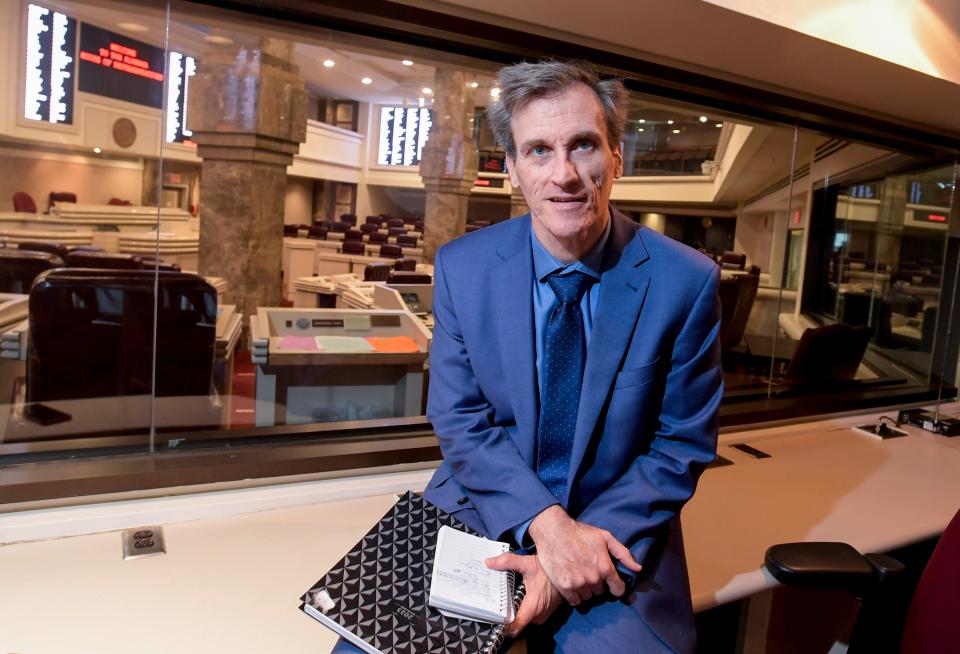The subject that never comes up in Alabama political campaigns? Alabama
Political campaigns in Alabama have one distinguishing feature: a total lack of interest in Alabama.
Oh sure, a candidate will speak of “Alabama values” while brandishing a gun and explaining why some Alabamians don’t count.
But if you want to talk about the state as you and I experience it, you’re not going to hear much.
Let’s go back to the ads in the 2022 GOP primary campaigns.
There was Gov. Kay Ivey, firing pistols, making cruel “jokes” about Mexican immigrants and acting like a mark for Donald Trump’s lies about the 2020 election.
There was her primary opponent Lindy Blanchard, who ran a spot suggesting the anti-abortion Ivey had plotted to keep abortion clinics open during the pandemic and another pearl-clutching ad over the thought of a school welcoming LGBTQ+ youth.
There was Tim James, another GOP challenger, whose whole campaign seemed to be a long wail about the existence of transgender youth.
Pop over to the U.S. Senate race last year. U.S. Sen. Katie Britt shot an ad on the southern border, which is not in Alabama, about securing the border with Mexico, which does not run through or near Alabama, and promised to deport undocumented immigrants, who by and large avoid our state. According to the U.S. Census, foreign-born people make up 3.8% of the state population, compared with 10.7% in Georgia and 13.9% in the nation as a whole.
There was Mike Durant, who once cut an ad that had more mentions of Afghanistan (1) than Alabama (0).
There are plenty of reasons for this. The nationalization of politics. Alabama Democrats not putting up strong alternatives. The overwhelming need for Republican politicians to kiss Trump’s ring and get spots on Fox News.
But it all leads to Alabama politicians ignoring the needs of the state they represent and focusing on the obsessions of the most militant base voters.
This is how a state with one of the nation’s highest rates of gun deaths has political conversations dominated by people who want to make it easier to obtain firearms.
It’s how a state that needs Medicaid to keep its health care system going has resisted Medicaid expansion. And sometimes, our leaders have gone further. In 2017, every Alabama Republican voted to repeal the Affordable Care Act, even though that would have led to Medicaid cuts that would have further devastated health care in rural areas, which many of our leaders claim to revere.
It’s not that national issues aren’t important or should be set aside when considering the next occupant of a federal office. This is a state where Black men and women in Montgomery, Birmingham, Selma and a host of other places put their lives on the line to call the nation’s attention to the injustices throughout the Jim Crow South.
But national issues — especially those reflecting the weird priorities of the 24-hour cable news consumer — shouldn’t be the sole topics of conversation.
Which brings us to a series we’re starting on Tuesday.
For the last few months, we’ve spoken with local leaders and officials about what the new 2nd Congressional District needs from its next representative.
The district was set up to provide Black Alabamians with the opportunity to elect their preferred leaders. The voters in the new district — running through Montgomery and the southern Black Belt — won’t lack choices: 21 candidates qualified to run in the race earlier this month.
Whoever gets elected will be representing over 700,000 Alabamians. And we wanted to learn what the district needs before the candidates start setting the boundaries of the discussion.
Some of the needs are universal. The district, like most of Alabama, needs infrastructure investments.
But the 2nd District also suffers from a lack of access to health care, driven in part by a higher-than-average uninsurance rate and lower earnings per capita than the state as a whole. Educators also have needs specific to the district that additional federal funding could address.
Can we expect the nearly two dozen candidates in the race to work on these matters?
I’m of two minds. Many of the candidates in the race have low name ID. More than a few did not live in the district as of qualification time. The temptation to build up one’s recognition by latching onto something that gets the base voters hot and bothered — and steer the conversation away from the district itself — will be strong.
But the early signs give me optimism. Several Democratic candidates, such as Reps. Napoleon Bracy, Juandalynn Givan and House Minority Leader Anthony Daniels, launched their campaigns by discussing the needs of the district, particularly on health care. Republican candidates Dick Brewbaker and Greg Albritton, while less specific, talked of cost-of-living issues or local infrastructure. That’s promising.
We don’t know how long this talk will hold, or where the focus of the campaign will end up.
But it’s the season of hope. And it’s a new district.
And maybe a new district can create a real political novelty in this state: an Alabama-centered campaign.

Brian Lyman is the editor of Alabama Reflector. He has covered Alabama politics since 2006, and worked at the Montgomery Advertiser, the Press-Register and The Anniston Star. His work has won awards from the Associated Press Managing Editors, the Alabama Press Association and Robert F. Kennedy Center for Human Rights. He lives in Auburn with his wife, Julie, and their three children.
Alabama Reflector is part of States Newsroom, an independent nonprofit website covering politics and policy in state capitals around the nation.
This article originally appeared on Montgomery Advertiser: A subject that never comes up in Alabama political campaigns? Alabama

